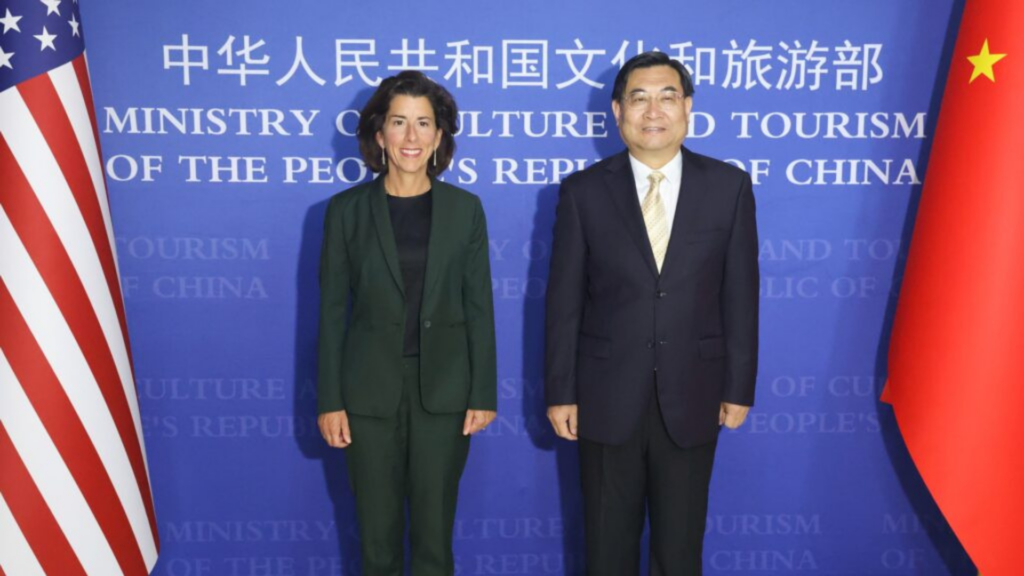Propaganda, Tourism and Culture: Hu Heping Taking Us for a Ride

November 22, 2023
A UHRP Insights column by Ben Carrdus, Senior Researcher, Uyghur Human Rights Project
In March 2018, as the world was beginning to wake up to the atrocities in East Turkistan, a more arcane task of Chinese statecraft was underway in Beijing. Xi Jinping was leading a wide-ranging reorganization of government agencies intended to ensure “pervasive Party leadership” over government. The restructuring included creation of a new “Ministry for Culture and Tourism.”
In August 2023, US Secretary of Commerce Gina M. Raimondo was in Beijing to meet the Minister for Culture and Tourism, Hu Heping, where both sides agreed to “foster better understanding” on tourism between the US and China while citing the importance of “people-to-people” exchanges to the broader US-China relationship.
Quite the propaganda coup for Minister Hu, but then, Minister Hu is also a Deputy Director of the Party’s central Propaganda Department: the 2018 reorganization to instill “pervasive Party leadership” in government included dual appointments, so that the heads of all “Culture and Tourism” offices, from the central ministry down to the counties, would also be the Deputy Director of the corresponding level’s Propaganda Department – a Party office, as opposed to a government one. As senior State Councilor Wang Yong put it when announcing the reform, the new ministry (backed by the Party’s Propaganda Department) would promote China’s “cultural soft power” and the “globalization of Chinese culture.”
Undoubtedly, the CCP Propaganda Department and the Ministry of Culture and Tourism under Hu Heping is heavily involved in trying to sell tourism in East Turkistan. UHRP has dubbed this a “mediawashing campaign” to show that the “New Uyghurs” are grateful for the Party’s care and that “Xinjiang is a happy place.” But what the Chinese party-state hasn’t criminalized about Uyghur culture, it has reduced to a tacky charade of tone-deaf songs, dances and mannequins – it is creating an anodyne Uyghur “brand,” a commodity to propagandize and hawk to tourists both domestically and internationally.
Hu Heping has even been to East Turkistan on at least three occasions: once in May 2021 when he was inspecting “cultural tourism” in the Xinjiang Production and Construction Corps (heavily implicated in forced labor); once in August 2022, when he took in a show called “Lift Your Hijab – Xinjiang is a Good Place;” and once in July 2023, when he attended an “ethnic dance” festival in Ürümchi (“Dancing Dreams – Peace and Beauty on the Silk Road”).
To engage with the Chinese Ministry of Culture and Tourism is to unavoidably engage with this Party-produced propaganda. And yet it is perfectly well understood within the US government that amid the ongoing atrocities, the Uyghur people are losing ownership of their culture to Chinese domination. No soft diplomatic language about “people-to-people” understanding can possibly ameliorate the cultural genocide being suffered by the Uyghur and Tibetan peoples.
To underscore the strength of the Chinese party-state’s stranglehold on Uyghur culture, three weeks after Secretary Raimondo met with Minister Hu, news broke of the life sentence imposed on Rahile Dawut, a renowned specialist in Uyghur folklore and traditions who had dedicated her life to the preservation and dissemination of Uyghur culture. She had been “disappeared” by the party-state in 2017 and held incommunicado ever since, evidently a casualty of “the Party’s cultural work guidelines and policies” that Wang Yong championed when announcing the new Ministry of Culture and Tourism and its linkage with the CCP Propaganda Department.
A US interlocutor is apparently due to meet with Minister Hu Heping again sometime “in the first half of 2024” to attend the 14th China-US Tourism Leadership Summit in China. Tourism is undoubtedly hugely important to the economies of both China and the US. But if one of the meeting’s aims is to “foster better understanding between the people and cultures of the two nations,” and in light of President Biden’s campaign pledge to “revitalize our national commitment to advancing human rights and democracy around the world,” the US must make sure high-level engagement doesn’t endorse genocide-denial propaganda.
